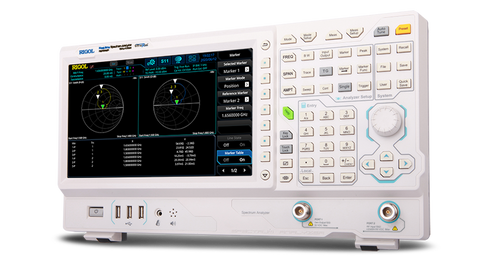Overview
The Rigol netwok analyzer mode adds significant capability to the RSA family of Spectrum Analyzers. Customers needing to characterize active or passive components, identify signal path errors or tune antennas will benefit from the complete VNA solution. Supports the following:
- S11 - Reflection Coefficient
- S21 - Forward Transmission
- Distance to Fault
The VNA Mode comes with a rich visualization set to quickly identify and resolve problems with your RF Designs
- Smith Chart
- Return Loss
- Standing Wave Ratio
- Phase Delay
- Insertion Loss
- Group Delay
- Return Loss
- Distance to Fault
-
Real-time RF analysis and Vector Network Analysis at an unprecedented price
- Spectrum analysis from 9kHz to 4.5Ghz
- VNA measurement application New (standard)
- DANL: <-161 dBm (typical)
- Phase noise: <-102 dBc/Hz (typical)
- Level measurement uncertainty: <1 dB
- Min. RBW 1 Hz
- Up to 40 MHz real-time analysis bandwidth
- 7.45 µsec 100% POI (at 40MHz)
- Advanced measurement functions
- EMI measurement application (option)
-
Real-time RF performance for mainstream IoT applications
- Spectrum analysis from 9kHz to 6.5Ghz
- VNA measurement application New (standard)
- DANL: <-165 dBm (typical)
- Phase noise: <-108 dBc/Hz (typical)
- Level measurement uncertainty: <0.8 dB
- Min. RBW 1 Hz
- Up to 40 MHz real-time analysis bandwidth
- 7.45 µsec 100% POI (at 40MHz)
- Advanced measurement functions
- VSA measurement application (option)
- EMI measurement application (option)
A "Forward Transmission” S-Parameter, known as an S21, describes how energy passes through a network. To make the measurement a signal is put into port 1 and measured at port 2. This is important when characterizing the performance of passive components like attenuators, splitters, and filters. See how easy it is to make an S21 measurement using the RIGOL Vector Network Analyzer function.











